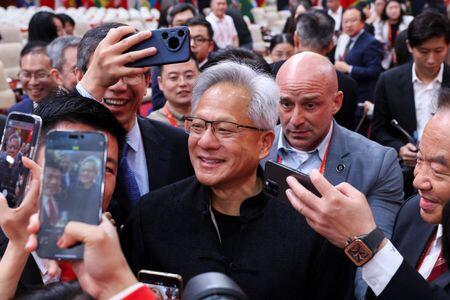Nvidia's AI Dominance Soars: CEO Confident as Strong Q3 Forecasts Fuel Market Excitement

AI chipmaker Nvidia, a pivotal force in the U.S. stock market rally since 2023, announced a third-quarter revenue forecast that slightly exceeded Wall Street estimates on Wednesday. The company projects revenue of $54 billion, plus or minus 2%, for the third quarter, surpassing analysts' average estimate of $53.14 billion. This robust outlook is fueled by strong demand for its artificial intelligence chips from cloud providers and hyperscalers, who are significantly expanding their infrastructure to power generative AI technology. Despite the positive forecast, shares of the world's most valuable firm initially dipped in extended trading, paring some of its earlier gains, with some reports noting a 2.4% to 3.2% decline in after-hours trading.
Nvidia’s second-quarter performance saw revenue of $46.74 billion, beating estimates of $46.06 billion. However, the market’s reaction indicated a shift in investor expectations. Analysts noted that while the results were strong, they weren't the 'blowout' figures investors had grown accustomed to. The modest sequential growth in the data center segment, around 5%, led some to suggest that cloud computing providers might be becoming more cautious with their spending. Brian Mulberry, a senior portfolio manager at Zacks Investment Management, pointed out that while Nvidia delivered a double beat on top and bottom lines, the stock's dip signaled a slowing rate of growth compared to the 100% revenue growth seen last year, now at 50-55%.
A significant factor influencing the forecast and market sentiment is the uncertainty surrounding Nvidia's business in China, caught in the U.S.-China trade war. CEO Jensen Huang expects eventual permission to resume selling chips to China, but with no formal U.S. rules in place, the company excluded potential China sales from its current quarter forecast. This decision meant foregoing an estimated $2 billion to $5 billion in potential H20 chip revenue. Michael Ashley Schulman, chief investment officer at Running Point Capital, aptly stated that 'Nvidia’s biggest bottleneck isn’t silicon, it’s diplomacy.' Despite the geopolitical hurdles, Nvidia's Chief Financial Officer Colette Kress confirmed that a single customer outside of China purchased $650 million worth of H20 reduced-capability chips in the latest quarter.
Despite the short-term volatility and recalibrated expectations, the overarching sentiment from industry experts remains bullish on the long-term prospects of the AI trade. Jensen Huang asserted that 'A new industrial revolution has started. The AI race is on,' projecting a massive $3 trillion to $4 trillion in AI infrastructure spend by the end of the decade. Thomas Martin of Globalt Investments echoed this, emphasizing that the AI trade is 'still at the very early stages.' David Wagner of Aptus Capital Advisors viewed the negative stock reaction as an 'incorrect knee-jerk reaction,' highlighting Nvidia's remarkable over 50% growth rate at a $50 billion quarterly revenue run rate and resilient gross margin guidance of 73.5%.
The strong demand for Nvidia's advanced chips continues, driven by Big Tech, data center owners, and a new push into 'sovereign AI,' targeting national governments as strategic clients, which Kress expects to generate $20 billion in revenue this year. Matt Orton of Raymond James Investment Management emphasized the 'durability' of the AI trade and that 'there's a lot of durability to this (AI) trade,' seeing no signs of a slowdown in hyperscalers' businesses. Nvidia's high-end Blackwell and earlier-generation Hopper chips are in high demand, largely spoken for based on future forecasts from major customers. The company also authorized an additional $60 billion in share repurchases, underscoring its financial strength and confidence in future growth. Ultimately, these results reaffirm that, despite the market's evolving expectations, the foundational demand for AI compute hardware remains robust, suggesting that we are not in an 'AI bubble' but rather in the early, high-growth phase of a significant technological shift.
You may also like...
2026 Jeep Cherokee Unveiled: Specs, Price, and Heritage Revival Spark Debate

Jeep re-enters the compact SUV market with the all-new 2026 Cherokee Hybrid, boasting a boxy XJ-inspired design and an e...
Mercedes-AMG GT XX Shatters EV Record, Dares Tesla to Catch Up

Mercedes-AMG's Concept AMG GT XX shattered 25 electric vehicle records during an ultramarathon run at Nardò, covering th...
Tornado Cash Trial Concludes with Guilty Verdict, Crypto Community Seeks Answers

The Tornado Cash trial has concluded with co-founder Roman Storm found guilty of conspiracy to operate an unlicensed mon...
Ethereum Skyrockets to New All-Time High, Legendary Trader Calls It 'Powerful'

Ethereum (ETH) has soared to a new historic peak of $4,885, marking its first all-time high in nearly four years, follow...
AI's Untamed Momentum: Nvidia's Explosive Growth & Future Outlook

AI chipmaker Nvidia's third-quarter revenue forecast surpassed Wall Street estimates, driven by strong demand for its ch...
Trade War Escalates: India Reacts to Crushing US Tariffs on Exports

India is responding to new US tariffs that will affect 55% of its merchandise exports by implementing national strategie...
Thai-Cambodian Border Boiling Point: Fake News, Assassination Plots, and Land Disputes Fueling Tensions

Tensions persist along the Thai-Cambodian border, fueled by accusations of assassination plots, alleged landmine deploym...
Shockwave in Equatorial Guinea: President's Nephew Jailed in Sex Tape Embezzlement Scandal

Equatorial Guinea's former financial investigation agency head, Baltasar Ebang Engonga, has been sentenced to eight year...



